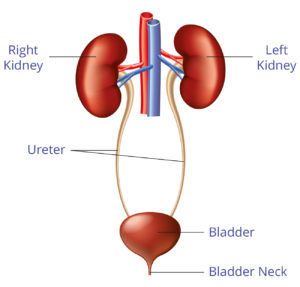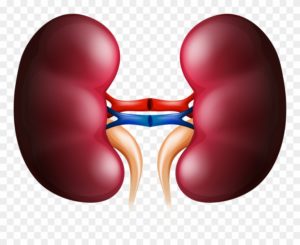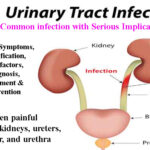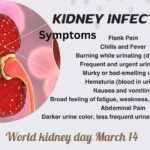Chronic kidney disease slowly gets worse over time. Diabetes is the most common cause of CKD. If detected early, right treatment can prevent further damage and slow down the progression of kidney disease.


Each of us has two kidneys. The kidneys are bean Shaped and about the size of a fist. They are located on either sides of the spine just below the ribcage. The main function of the kidneys is to filter the extra water and waste products from the blood and make urine. They also help in keeping blood pressure under control and keeping bones healthy. They make certain hormones that our body needs to stay healthy.
Kidney diseases:
There are two major types of kidney disease, namely acute and chronic kidney disease. The acute variety is due to various causes like drugs, infections, dehydration, radio contrast injections etc. The acute kidney injury or failure is curable. Some may need dialysis support for a short period before recovery. Chronic kidney Disease (CKD) is one in which the kidneys are damaged slowly and irreversibly. As a result the kidneys are not able to do their job. Waste and water builds up in the blood. This is very harmful to the body and makes the person unwell.
It is estimated that 20 million people are suffering from CKD worldwide. Above one million patients are being treated for End State Kidney Disease (ESRD) with dialysis or transplantation. The incidence of CKD is increasing raidly. In India only about 5% of the patients get some form of treatment for ESRD for the rest it is either not available or prohibitively costly.
Chronic Kidney Disease (CKD) is a silent disease!
There are no symptoms in the early stages of the disease. Symptoms occur only in the late stages of the disease. Early detection of CKD is possible only by testing the blood and urine. The following are some of the symptoms of kidney disease:


1. Getting tired easily.
2. Poor appetite.
3. Sleep disturbances.
4. Swelling of feet and ankles.
5. Early Morning puffiness around the eyes.
6. Frequent urination, especially at night.
There is no cure for chronic kidney disease. It slowly gets worse over time. Kidney disease can turn into kidney failure (End Stage Kidney Disease). At this stage the only treatment options available are DIALYSIS AND KIDNEY TRANSPLANTATION.
Diabetes is the most common cause of CKD:
Diabetes is a very common ailment now. An estimated 177 million people have diabetes worldwide. It is predicted that by the year 2030, 360 million people would be suffering from diabetes worldwide. About 40% of the diabetics are likely to develop kidney disease. This makes diabetes the most common cause of CKD. High blood pressure, hereditary diseases like polycystic kidney diseases, kidney stones and urinary infections are some of the other cases of chronic kidney diseases.
Early detection of kidney disease helps:
If detected early, right treatment can prevent further damage and slow down the progression of kidney disease. Prompt treatment with medications like ANGIOTENSIN CONVERTING ENZYME inhibitors or ANGIOTENSIN RECEPTOR BLOCKERS and other measures including diet and lifestyle modifications can keep the kidneys healthy for a longer period of time. If you have one of the risk factors it is worthwhile to get screened for kidney disease with blood and urine tests. The risk factors for chronic kidney disease are:


1. Diabetes
2. High blood pressure
3. A close family member suffering from kidney failure
4. Age over 50 years
5. Having heart disease
Tips to keep kidneys healthy:
1. Get blood and urine checked for kidney disease if at risk.
2. Diabetic patients need to get their kidney tests done at least once a year.
3. Keep blood pressure below 130/80.
4. Keep diabetes under control.
5. Keep cholesterol levels in the target range.
6. Take medicines as prescribed.
7. Eat healthy and cut back on salt.
8. Quit Smoking.
9. Be physically active.
10. Maintain healthy body weight.
The kidney tests:
1. Serum creatinine level and eGFR estimation.
2. Urine for albumin.
Know your kidney Number – GLOMERULAR FILTRATION RATE(GFR):


GFR stands for Glomerular Filtration Rate. GFR measures how much blood your kidneys filter each minute. It is reported as a number. It is calculated from the blood creatinine levels.
1. GFR of 60 of higher is in normal range.
2. GFR below 60 may mean you have kidney disease
3. GFR of 15 or lower may mean kidney failure.
Urine albumin test:
Urine test detects protein or albumin. Albumin does not pass through a healthy kidney into the urine. If kidneys are damaged, albumin can pass into the urine, One cannot see or feel albumin in urine. So urine test is very important to detect kidney disease.











